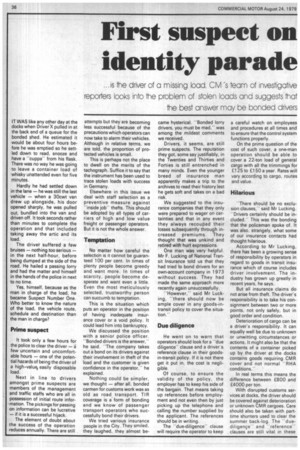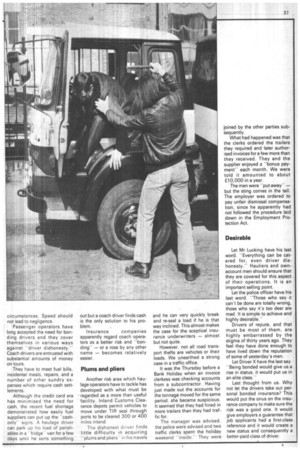First suspect on Identity parade
Page 38

Page 39

If you've noticed an error in this article please click here to report it so we can fix it.
.„ is e driver of a missing load. CM "s team of investigative reporters looks into the problem of stolen loads and suggests that e best answer may be bonded drivers
IT WAS like any other day at the docks when Driver X pulled in at the back end of a queue for the bonded shed. He estimated it .would be about four hours before he was emptied so he settled down to read, snooze and have a "cuppa" from his flask. There was no way he was going to leave a container load of whisky unattended even for five minutes.
Hardly he had settled down in the lane — he was still the last vehicle — when a 30cwt van drew up alongside, his door opened sharply, he was pulled out, bundled into the van and driven off. It took seconds rather than minutes to complete the operation and that included taking away the artic and its load.
The driver suffered a few bruises — nothing too serious — in the next half-hour, before being dumped at the side of the road. He hailed a passing lorry and had the matter and himself in the hands of the police in next to no time.
Yes, himself, because as the man in charge of the load, he became Suspect Number One. Who better to know the nature of the load, the vehicle route, schedule and destination than the man in charge?
Prime suspect
It took only a few hours for the police to clear the driver — few uncertain and uncomfortable hours — one of the potential hazards of being the driver of a high-value, easily disposable load.
Next in line to drivers amongst prime suspects are members of the management and traffic staffs who are all in possession of initial route information. The pickings for passing on information can be lucrative — if it is a successful hijack.
The element of doubt about the success of the operation reduces annually. There are still attempts but they are becoming less successful because of the precautions which operators can now take to alarm their vehicles. Although in relative terms, we are told, the proportion of protected vehicles is small, This is perhaps not the place to dwell on the merits of the tachograph. Suffice it to say that the instrument has been used to trace stolen loads with success in Germany.
Elsewhere in this issue we deal with staff selection as a preventive measure against "inside job" thefts. This should be adopted by all types of carriers of high and low value freight or passenger operators. But it is not the whole answer.
Temptation
No matter how careful the selection is it cannot be guaranteed 100 per cent. In times of plenty people become greedy and want more. In times of scarcity, people become desperate and want even a little. Even the most meticulously selected, trustworthy person can succumb to temptation.
This is the situation which puts an operator in the position of having inadequate insurance cover or a void policy. It could lead him into bankruptcy.
We discussed the position with a senior police officer. "Bonded drivers is the answer, he said. "The company takes Out a bond on its drivers against their involvement in theft of the load and the customer is given confidence in the operator,he explained.
Nothing could be simpler, we thought — after all, bonded carmen for customs work was as old as road transport. TIR coverage is a form of bonding and we know of passenger transport operators who successfully bond their drivers.
We tried various insurance people in the City. They smiled, they laughed, they almost be
came hysterical. -Bonded lorry drivers, you must be mad,' was among the mildest comments we received.
Drivers, it seems, are still prime suspects. The reputation they got, some say justifiably, in the Twenties and Thirties and Forties is still entrenched in many minds. Even the younger breed of insurance man apparently makes a trip to the archives to read their history lest he gets soft and takes on a bad risk_ We suggested to the insurance companies that they only were prepared to wager on certainties and that in any event they always recouped their losses subsequently through increased premiums. They thought that was unkind and retired with hurt expressions.
One man, was very helpful. Mr F. Lucking of National Transit Insurance told us that they had tried to bond drivers for an own-account company in 1973 without success. They had made the same approach more recently again unsuccessfully.
"However," said Mr Lucking, "'there should now be ample cover in any goods-intransit policy to cover the situation.
Due diligence
He went on to warn that operators should look for a "due diligence" clause and a driver's, reference clause in their goodsin-transit policy. If it is not there get it put in, the cost is negligible.
Of course, to ensure the validity of the policy, the employer has to keep his side of the bargain. That means taking up references before employment and not even then by just picking up the telephone and calling the number supplied by the applicant. The references should be in writing.
The "due-diligence" clause will require the operator to keep a careful watch on employees and procedures at all times and to ensure that the control system functions properly.
On the prime question of the cost of such cover, a one-man operation should be able to cover a 22-ton load of general cargo with all the trimmings for El 25 to £150 a year. Rates will vary according to cargo, routes and value.
Hilarious
"There should be no exclusion clauses," said Mr Lucking. "Drivers certainly should be included." This was the bonding that the policeman spoke of. It was also, strangely, what some of our insurance contacts had thought hilarious.
According to Mr Lucking, there has been a growing sense of responsibility by operators in regard to goods in transit insurance which of course includes driver involvement. The industry has grown up greatly in recent years, he says.
But all insurance claims do not arise from theft. The driver's responsibility is to take his consignment between two or more points, not only safely, but in good order and condition.
Deterioration of cargo can be a driver's responsibility. It can equally well be due to unknown or unwitting circumstances or actions. It might also be that the contents of 'a container picked up by the driver at the docks contains goods requiring CMR cover and not normal "RHA conditions."
In real terms this means the difference between £800 and £4000 per ton.
With disrupted customs services at docks, the driver should be covered against deterioration or unknown CMR cargoes. Care should also be taken with parttime shumers used to clear the summer back-log. The "duediligence" and "reference' clauses are still vital in these circumstances. Speed should not lead to negligence.
Passenger operators have long accepted the need for bonding drivers and they cover themselves in various ways against "driver dishonesty.'" Coach drivers are entrusted with substantial amounts of money on tours.
They have to meet fuel bills, incidental meals, repairs, and a number of other sundry expenses which require cash settlements.
Although the credit card era has minimised the need for cash, the recent fuel shortage demonstrated how easily fuel suppliers can put up the "cashonlysigns. A haulage driver can park up his load of perishables in a " fridge"' van for a few days until he sorts something
out but a coach driver finds cash is the only solution to his problem.
Insurance companies apparently regard coach operators as a better risk and "bonding— or a rose by any other name — becomes relatively easier.
Plums and pliers
Another risk area which haulage operators have to tackle has developed with what must be regarded as a more than useful facility. Inland Customs Clearance depots permit vehicles to move under TIR seal through ports to be cleared 300 or 400 miles inland.
The dishonest driver finds little difficulty in acquiring "'plums and pliers"' in his travels and he can very quickly break and re-seal a load if he is that way inclined. This almost makes the case for the sceptical insurance underwriters — almost but not quite.
However, not all road transport thefts are vehicles or their loads. We unearthed a strong case in a traffic office, It was the Thursday before a Bank Holiday when an invoice clerkess was checking accounts from a subcontractor. Having just made out the accounts for the tonnage moved for the same period, she became suspicious. It seemed that they had hired in more trailers than they had traffic for.
The manager was advised, the police were advised and two traffic clerks spent the holiday weekend -inside.They were
joined by the other parties subsequently.
What had happened was that the clerks ordered the trailers they required and later authorised invoices for a few more than they received. They and the supplier enjoyed a "bonus payment" each month. We were told it amounted to about £10,000 in a year.
The men were ''put away" — but the sting comes in the tail. The employer was ordered to pay unfair dismissal compensation, since he apparently had not followed the procedure laid down in the Employment Protection Act.
Desirable
Let Mr Lucking have his last word. "Everything can be catered for, even driver dishonesty."' Hauliers and ownaccount men should ensure that they are covered for this aspect of their operations. It is an important selling point.
Let the police officer have his last word. -Those who say it can't be done are totally wrong, those who say it's too dear are mad_ It is simple to achieve and highly desirable.
Drivers of repute, and that must be most of them, are highly embarrassed by the stigma of thirty years ago. They feel they have done enough to have lived down the reputation of some of yesterday's men.
Let Driver X have the last say "Being bonded would give us a rise in status, it would put us in an elite class.
Last thought from us. Why not let the drivers take out personal bonded insurance? This would put the onus on the insurance company to make sure the risk was a good one. It would give employers a guarantee that job applicants had a first-class reference and it would create a new status and consequently a better-paid class of driver.








































































































